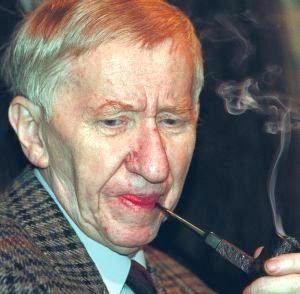Maciej Słomczyński
[Joe Alex] , 1922 - 1998
Maciej Słomczyński* was a writer, screenwriter, and translator. Son of an English woman Marjorie Crosby and of Merian C. Cooper, an American aviator, officer of the American Air Force and Polish Air Force (The Kościuszko Squadron), and later a film director (he directed and produced King Kong in 1933). When Cooper left Poland, Marjorie remained and married Aleksander Słomczyński. Maciej was adopted by his stepfather. As a child he lived in Milanówek (near Warsaw) but grew up surrounded by English culture; as he said himself, his first language was English.
He attended the Piarist Gymnasium in Rakowice (today a Cracow suburb). In 1939 he passed his final high school exam in Wejherowo (a town in Pomerania near Gdańsk). In the same year, he returned to Milanówek and became involved in the Resistance: in 1941, he joined Konfederacja Narodu (Confederation of the Nation, a Polish resistance organization), and in 1943, he became a soldier of Armia Krajowa [Home Army]. In 1944 he was arrested by the Germans and imprisoned in Pawiak, the notorious Gestapo prison in Warsaw; fortunately he escaped but was later captured again and deported to a labour camp in Austria; he managed to get away from there by escaping to Switzerland. After that, he worked for the 3rd US Army under gen. Patton and the American gendarmerie in Paris. He returned permanently to Poland in 1947, lived in Łódź and later in Cracow. A very prolific writer, he published his first text, Ballada o kucharzu i literacie [Ballad about the Cook and the Writer], in a Łódź weekly “Tydzień.” In 1947, he published a collection of poems for children, Makówka z Milanówka [Poppy Head from Milanówek]. During the Communist regime, he was suspected of being an English spy, and was invigilated.
He used a pen-name Joe Alex to sign his crime stories (Zmącony spokój Pani Labiryntu [Disturbed Peace of the Lady of the Labyrinth], 1965; Piekło jest we mnie [Hell Is in Me], 1975); screenplays (Zbrodniarz i panna [The Criminal and the Maiden], 1963; Gdzie jest trzeci król [Where Is the Third King], 1966), and an adventure novel in eleven volumes Czarne okręty [The Black Ships], 1972–1975. He also used the pen-name Kazimierz Kwaśniewski for some of his screenplays.
Słomczyński was also a prominent translator of many English language classics into Polish, i.e., Lewis Carroll’s Alice in Wonderland, John Milton’s Paradise Lost, Robert Louis Stevenson’s Strange Case of Dr. Jekyll and Mr. Hyde, James Joyce’s Ulisses, and all of Sheakespeare’s plays. He wrote for Polish Radio Łódź, and Polish TV Teatr Sensacji “Kobra” [Theatre of Sensation “Cobra”]. Member of Stowarzyszenie Pisarzy Polskich [Polish Writers’ Association], and Rotary Club; Vice-Chairman of James Joyce’s International Foundation and, since 1973, member of the Irish Institute.
In 1997 he was awarded the Comander’s Cross with Star of the Order of Polonia Restituta (for outstanding achievements in national culture).
* The exact year of his birth, either 1920 or 1922, is the subject of argument even among members of his closest family. The date 1922 is postulated by Maciej Słomczyński’s daughter.
Sources:
Kucharczyk-Kubacka, Monika, Maciej Słomczyński. Bibliografia, Kraków: Wojewódzka Biblioteka Publiczna w Krakowie, 2008.
"Maciej Słomczyński" in Jadwiga Czachowska; Alicja Szałagan, edd., Współcześni polscy pisarze i badacze literatury. Słownik biobibliograficzny, vol. 7: R–Sta, Warszawa: Wydawnictwa Szkolne i Pedagogiczne, 2001, 335.
Słomczyńska-Pierzchalska, Małgorzata, Nie mogłem być inny. Zagadka Macieja Słomczyńskiego, Kraków: Wydawnictwo Literackie, 2003.
Sucharski, Robert A., “Joe Alex (Maciej Słomczyński) and His Czarne okręty [Black Ships]: A History of a Trojan Boy in Times of the Minoan Thalassocracy,” in Katarzyna Marciniak, ed., Our Mythical Hope: The Ancient Myths as Medicine for the Hardships of Life in Children’s and Young Adults’ Culture, Warsaw: Wydawnictwa Uniwersytetu Warszawskiego, 2021, 211–213.
Bio prepared by Joanna Kozioł, University of Warsaw, joasia7777@interia.pl
Records in database:



